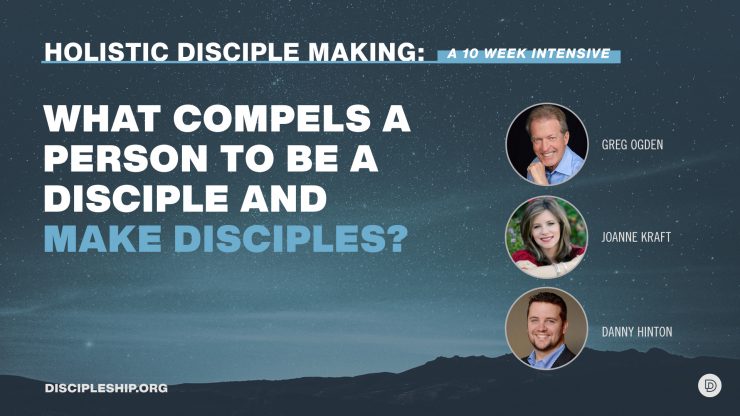Disciples Are Best Made by Community
The Reverse Adoption Agency
It was a unique idea. But then, Mack Fuewl was anything but ordinary. He stood 6’7” and carried 340lbs, but always called his wife Sonia to kill spiders. He loved kids, but never wanted any of his own. Mack’s heart matched his size and gave birth to his vision.
Mack and Sonia loved watching kids play at the park as families came and went. There was nothing like the way the kids laughed and played without a care in the world. While the kids played, the parents were distracted. It was such a contrast!
He observed too how mothers scolded sons for running up the slide and how fathers caused tears by saying no when daughters wanted them to slide down too. The worst moment for Mack though was when the parent would declare, “Time to go,” and the child would cry, protest, or complain.
One day everything changed. A yellow bus pulled up and out poured dozens of five-year olds and four adults all in matching t-shirts. In an instant the playground was filled with running, climbing, and laughing. As the kids played, the adults talked together and watched the kids play. Not once was an adult asked to climb and not once was a kid scolded. It was perfect playground harmony.
Mack was so immersed in the drama that the loud whistle startled him. As the sound faded from the air, the kids stopped playing and ran back onto the bus. There were no tears. No complaints. No fits. Instead, the children and the adults happily boarded the bus and drove away. As the bus turned, he was able to read, “Riverside Children’s Home.” Immediately, it all made sense to him.
“Sonia, did you see that?” Mack asked his dear wife.
“Yes, that bus didn’t even stop at the stop sign!”
“No, not that,” Mack said laughing, “The kids from that orphanage are much happier than those with a parent.”
Sonia excitedly replied, “Hey, you’re right! They played so happily! They ran and jumped and the adults never raised their voice. And when the whistle blew they left without so much as a groan.”
“Right! And did you notice that the adults actually talked together instead of getting lost in their phones?!”
Mack and Sonia reflected in silence for a few minutes before Mack declared, “We’ve got to do something to help those other children. And I know just what to do.”
And he did. After a few months of learning about how the programs and processes of the Riverside Children’s Home worked they formed The Orphanage Foundation whose motto was “It takes an orphanage to raise a child.”
Soon Mack had a board of directors and a team of people who recruited parented children to their services. The Orphanage Foundation functioned much like the Children’s Home, but it had the opposite goal. Instead of taking in and caring for kids without parents, they took in and cared for kids with parents.
As you might expect it was a controversial idea. Soon though, everyone saw the wisdom of allowing the community to raise a child to maturity. It solved so many problems. Instead of a child becoming dependent on one or two parents, they were trained by many specialists. Instead of a parent passing on their weakness to the child, the child was only exposed to strengths. The result were children who grew and developed very quickly.
Justin Gravitt, author of this blog, is with Navigator’s Church Ministries. They have made available to you, “The Start Small Grow Slow Strategy,” which you can download for free here.
Another advantage of large group training was that they could learn by interacting and talking with one another. One especially popular program was the Sunday morning service in which the Foundation’s director would teach all three hundred children at once. The kids loved listening and afterwards they went outside to play as they always had.
The other popular program was the “peapod initiative.” Once a week, the kids were put into groups of 10-15 (a peapod) with other kids who were most alike. During those times they hung out, talked about Sunday’s service, and what they were worried about. This was a special time because no expert was present. They could just be themselves. They were encouraged to have a program, but normally they just talked. After all, they felt strongly that being together was more important than doing anything.
The Foundation was a win for the former parents as well. They had long felt unprepared for the huge responsibility of parenting. Now they had more time to do what they enjoyed and what they were good at. They still had a relationship with the children, some more than others of course. But adults were able to focus on being friends with their child or teaching something they were good at. Both parents and children loved the change!
Initially, the Orphanage Foundation only accepted children aged 5-13. The Foundation’s first years were wildly successful. However, over time, it became apparent that all the positivity masked two big problems.
First, the Foundation realized that classes and programs were insufficient in teaching children how to relationally care for others. As children were removed from parented homes they became harsh, emotionally distant, and exacting. Graduates entered counseling programs and told the same story. Things weren’t perfect when they had parents, but they knew they were loved by someone. It was evident when a mom tried to fix a bicycle or when a dad burned dinner while trying to help understand math homework. It was unmistakable when an argument happened and the next day mom still made a delicious breakfast and said, “I love you.”
The Foundation’s group setting was never able to replicate such a deep relationship. Actually, it never even thought to try.
The second problem was connected to the first.
Very few foundation graduates married or had children. Since group life was all most had ever known, they had little vision or interest in marrying or bearing children. It wasn’t long before the city noticed a huge drop in the birthrate. It was gradual at first and attributed to other factors, but eventually a researcher (and Foundation graduate) proved the link. If something didn’t change the Foundation would run out of kids to enroll. Without reproduction the survival of the Foundation—and the town—were in jeopardy.
Finally, foundation graduates struggled to process their own weaknesses.
Since the graduates had never seen weakness in others, they didn’t know how to handle it in themselves. When they failed, they folded. This impacted graduates in many ways. Most struggled with motivation to work, to grow, or to improve. The kids had always been told where to go, when to go, and what to do, so the ownership becoming requires never had a chance to take root. External motivation and support had always been supplied by the institution. Though a few graduates did fine, most fell into some form of depression or addiction.
For Mack and Sonia the findings were devastating. They withdrew from the Orphanage Foundation ten years after it began. To their dismay the Orphanage Foundation continues, twenty-five years later, advertising a “better life” for adults and kids alike.
The child shortage has brought a few changes. The Foundation now takes in children of all ages, from infant to 17. But adults can join now too. In order to become a member, they simply move in, attend programs, and pay weekly membership dues.
As painful as it’s been, Mack and Sonia learned from their mistakes. They adopted three kids from the Riverside Children’s Home. It wasn’t long before they were grandparents, and now they are great grandparents many times over.
Today they lead a new movement that works to undo the effects of the Orphanage Foundation. They teach people to invest in children relationally, intentionally, and intrusively. Despite the pain of their story they are excited about what God’s doing through them.
In talking with Mack for this story, his biggest learning has been, “Groups are good, but we can’t ever look to them to replace the parent-child relationship. Think about it, God has never allowed a baby to be born apart from its Mom. Perhaps it’s because the relationship is that important!”
Written by Justin Gravitt
Justin Gravitt is the Dayton (Ohio) Area Director for Navigator Church Ministries. Read more from Justin at his blog, “One Disciple to Another,” where this article first appeared.
https://www.justingravitt.com/blog/lies-communityoverparents






